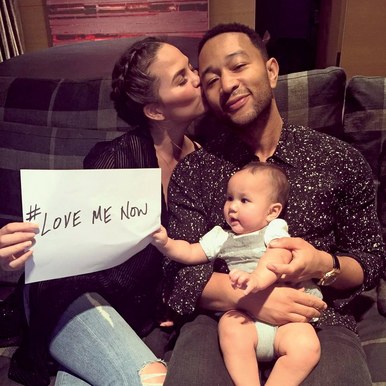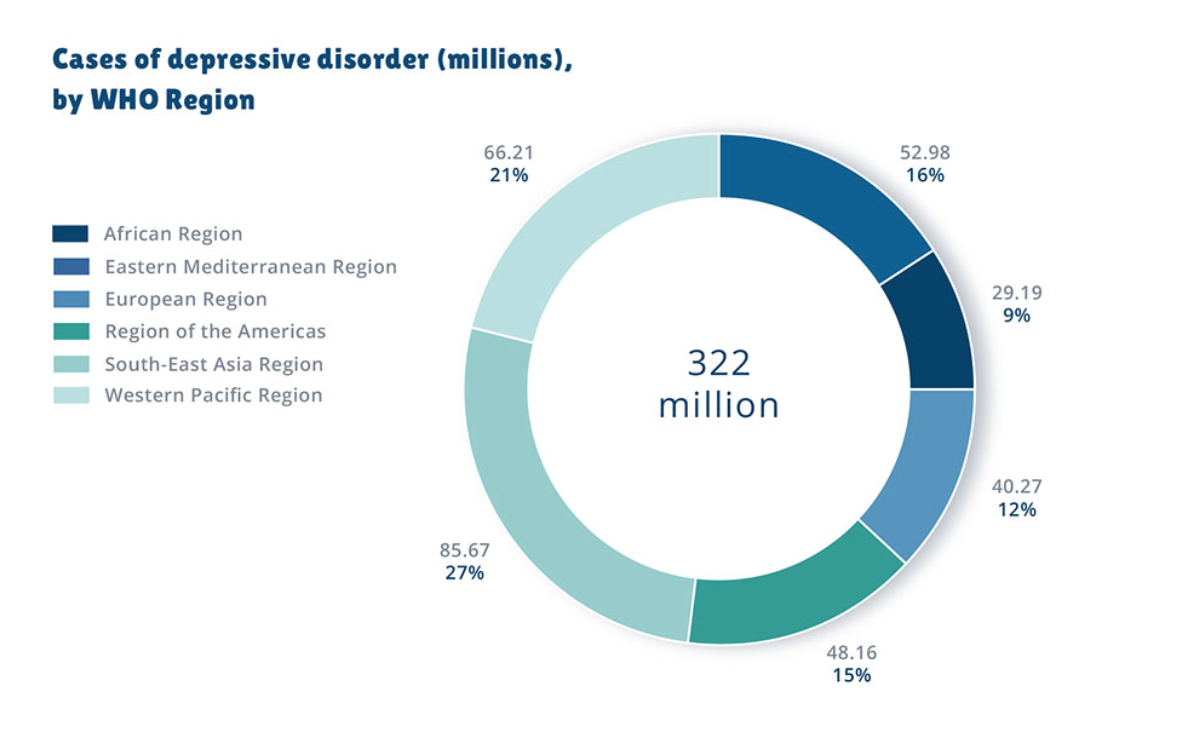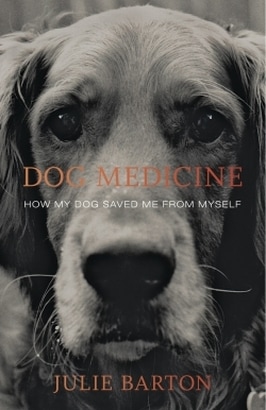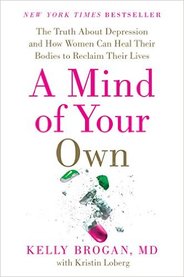
 In her eighth poem of the series, poet Brenda McDonald describes what it's like to carry the burden of a secret. For many one's secret may be their mental illness, their suicidal thoughts, or their struggles with substance abuse and addiction. As Brenda beautifully alludes to, having such a secret can be immensely painful; however, there is light, hope, and relief when one is able to release this darkness by finding someone who they feel safe to share it with.
0 Comments
 In a powerful essay for Glamour magazine, Chrissy Teigen shares her experience with postpartum depression, following the birth of her daughter Luna. Postpartum depression is very common as it can affect up to 20% of new mothers. However, as Chrissy eloquently describes, it can be incredibly difficult for one to recognize the disorder amongst themselves, but help is available in the form of additional support, psychotherapy, and medication. "Before the holidays I went to my GP for a physical. John sat next to me. I looked at my doctor, and my eyes welled up because I was so tired of being in pain. Of sleeping on the couch. Of waking up throughout the night. Of throwing up. Of taking things out on the wrong people. Of not enjoying life. Of not seeing my friends. Of not having the energy to take my baby for a stroll. My doctor pulled out a book and started listing symptoms. And I was like, “Yep, yep, yep.” I got my diagnosis: postpartum depression and anxiety ... ... Before this, I had never, ever—in my whole entire life—had one person say to me: “I have postpartum depression.” Growing up in the nineties, I associated postpartum depression with Susan Smith [a woman now serving life in prison for killing her two sons; her lawyer argued that she suffered from a long history of depression], with people who didn’t like their babies or felt like they had to harm their children. I didn’t have anything remotely close to those feelings. I looked at Luna every day, amazed by her. So I didn’t think I had it. I also just didn’t think it could happen to me. I have a great life. I have all the help I could need: John, my mother (who lives with us), a nanny. But postpartum does not discriminate. I couldn’t control it. And that’s part of the reason it took me so long to speak up: I felt selfish, icky, and weird saying aloud that I’m struggling. Sometimes I still do." To read the full story, visit: http://www.glamour.com/story/chrissy-teigen-postpartum-depression  In this poem, Anna Lente, poet, artist, and The Mighty contributor, helps us to grasp a little understanding of what it's like for individuals who suffer from multiple mental health disorders such as anxiety and bipolar disorder. "... Another day Mania spins me in circles, My mind leaping to dizzying heights, Spiraling flights of thoughts, Dangerous impulses, While I use every bit of my inner strength to Sit and stay, Waiting for the eventual Crash back into depression. Then crawling out from depression Back to something akin to normal. Some days loud, crowded spaces trigger panic attacks. I enter rooms looking for empty corners and exit signs. I enter conversations listening for pauses so I can escape. A panic attack means a quick retreat To the safe space of my car, The comfort of my home. I cover myself in blankets In the comfortable cocoon of my recliner, Listen to my favorite songs on repeat, Tell myself everything will be OK..." To read the full poem, visit: https://themighty.com/2017/03/poem-living-with-multiple-mental-illnesses/  Recently, the World Health Organization (WHO) released a report that examined the global health impact of common mental health issues including depression and anxiety. The report provides estimates of the prevalence of such conditions globally, and how these prevalence has changed in the last decade, in addition to the overall consequences on our health and well-being. Most strikingly, the report demonstrates that over 300 million people worldwide or 4.4% of the global population are affected by depression; an increase of 18% in the last decade. In addition, the WHO has now ranked depression as the leading cause of disability worldwide (leading to 50 million Years Lived With Disability), due to the considerable losses on health and functioning it causes. Anxiety disorders was also found to affect over 250 million people worldwide or 3.6% of the global population; an increase of 14.9% in the last decade. Anxiety disorders are ranked 6th in terms of contributing to global disability. "When long-lasting and with moderate or severe intensity, depression may become a serious health condition leading, at its worst, to suicide. According to the report, some 800,000 people kill themselves every year, a significant number of them young adults between the ages of 15 and 29." For the full report, click here: http://apps.who.int/iris/bitstream/10665/254610/1/WHO-MSD-MER-2017.2-eng.pdf?ua=1 For a shorter synopsis of the report, visit: http://www.un.org/apps/news/story.asp?NewsID=56230#.WL3-zTveLVo  Writer Julie Barton, was just 22 years old when she became wrapped in the grips of severe depression. She and her family tried multiple avenues to get her the help that she needed including trials of medication and working with psychiatrists; however, it wasn't until she met a puppy named Bunker that she felt the strength she needed to go on. In her memoir Dog Medicine, Barton beautifully and accurately describes the dark depths of depression, from the relentless melancholy to the questioning of the importance of one's life; and expertly addresses themes of abuse, self-doubt, and family, touching on many aspects that add complexity to one's mental health. However, readers can feel a shift in her writing upon meeting Bunker, illustrating just how powerful and life-saving a connection between animal and human can be. With Bunker at her side, Barton is able to find herself and move forward; a true story of hope and resilience that encourages self-acceptance and forgiveness. Recommended for: Dog lovers, those who have struggled with depression In this TEDMED talk, concert pianist Zsolt Bognor speaks briefly to his experience of depression and how he found comfort and healing in classical music. Bognor also shares with viewers two of his favourite pieces by Austrian composer Franz Peter Schubert who was believed to have struggled with depression too. Do you think music can be therapeutic when it comes to mental health? What songs do you listen to that provide you with solace or work to lift your spirits? Dr. Sherwin B. Nuland was a renowned physician who practiced surgery for more than thirty years, in addition to teaching at Yale School of Medicine, his alma mater, and penning over a dozen books many of which explored lessons he had learned through his career in medicine. One of his books, "How We Die: Reflections on Life's Final Chapter ", won numerous accolades as Nuland explored the concept of death with dignity. What many may not know about Dr. Nuland, who passed away in 2014, was that he struggled with severe depression in the midst of his surgical career in the 1970s. Dr. Nuland spent time in psychiatric institutions, and tried various antidepressants, however none were successful and his mental illness seemed refractory to traditional treatments. Though staff psychiatrists suggested a pre-frontal lobotomy as the next step, a resident suggested electroconvulsive therapy (ECT) instead, a treatment method that had become less popular since the introduction of pharmaceuticals, but could be beneficial and came without the consequences of a lobotomy that may affect his medical career. In this powerful and must watch TED talk, Dr. Nuland discusses the history and development of ECT, as well as shares his story of "relief, redemption and second chances" as he describes how ECT helped treat the depression which was so severe that it had rendered him essentially non-functional. #depression redefined in Dr. Kelly Brogan's new novel ' A Mind of Your Own' where she cites lifestyle imbalances and inflammation as potential causes. She urges her patients to see:
'depression as an opportunity, a sign for us to stop and figure out what’s causing our imbalance rather than just masking, suppressing, or rerouting the symptoms. It’s a chance to choose a new story, to engage in radical transformation, to say yes to a different life experience.' http://goop.com/the-roots-of-mental-health-maybe-theyre-not-in-our-heads/?utm_source=bronto&utm_medium=email&utm_term=The+Roots+of+Mental+Health  Depression redefined in Dr. Kelly Brogan's new novel ' A Mind of Your Own' where she cites lifestyle imbalances and inflammation as potential causes. She urges her patients to see: "Depression as an opportunity, a sign for us to stop and figure out what’s causing our imbalance rather than just masking, suppressing, or rerouting the symptoms. It’s a chance to choose a new story, to engage in radical transformation, to say yes to a different life experience." For more information, check out: http://goop.com/the-roots-of-mental-health-maybe-theyre-not-in-our-heads/?utm_source=bronto&utm_medium=email&utm_term=The+Roots+of+Mental+Health  Could Instagram be used to help monitor one's mental health or in screening for depression? A recent study suggests this may just be in our future ... The study, conducted by researchers at Harvard University and the University of Vermont, analyzed over 43,000 photos posted on Instagram by 166 volunteers. The volunteers were also asked to complete surveys that looked at their social media use, as well as history of mood disorder diagnoses and symptoms of depression. The results indicated that certain features, such as colour, brightness, and number of faces, of one's online photos may be possible markers for or indicators of depression. "Those who were depressed tended to post photos with increased hue, decreased brightness, and decreased color saturation. Overall, their photos were “bluer, grayer, and darker.” They also tended to post more frequently and use more Instagram filters, the most popular one for depressed participants being Inkwell, which turns a photo black and white. The most popular filter for volunteers who weren’t depressed was Valencia." To learn more about the study, click here: https://arxiv.org/ftp/arxiv/papers/1608/1608.03282.pdf http://fortune.com/2016/08/22/instagram-diagnose-depression/ |
Description
Supporting and enhancing students' and health professionals' knowledge and understanding of mental health and psychiatry
Archives
June 2017
Categories
All
|
 RSS Feed
RSS Feed
